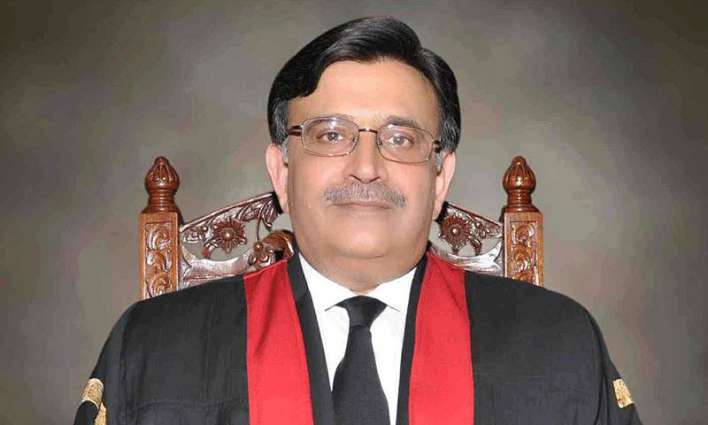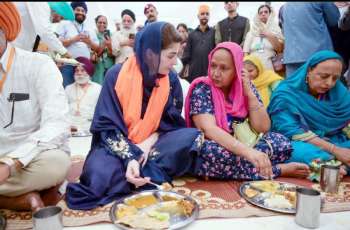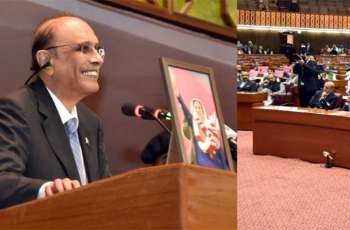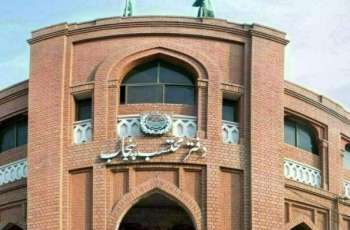Chief Justice of Pakistan Umar Ata Bandial has also proposed a pay cut for himself and other judges to cover the expenses of elections, as the government did not have the funds to give to the ECP for polls.
ISLAMABAD : (UrduPoint/Pakistan Point News-March 28th, 2023) Chief Justice of Pakistan Umar Ata Bandial on Tuesday remarked that that the opinion of two top court judges in the previous Supreme Court verdict over the Punjab and KP elections is not relevant to this case.
The top judge made these remarks while heading a five-member bench seized with the hearing of the petitions challenging ECP’s decision to postpone elections of Punjab and KPK till Oct 8.
Justice Ijazul Ahsan, Justice Munib Akhtar, Justice Aminuddin Khan, and Justice Jamal Khan Mandokhail were the other members of the bench.
The CJP’s remarks came in response to two Supreme Court judges, Justice Mansoor Ali Shah and Justice Jamal Khan Mandokhail, who called for a review of the "one-man show" powers enjoyed by the Chief Justice.
The two judges issued a dissenting note on the Punjab and KP election suo motu notice taken by the Chief Justice, stating that the CJP has the authority to take suo motu notice and constitute special benches, but it will result in criticism and affect the public's trust in the Supreme Court.
They further held that the power of the "one-man show" enjoyed by the office of the Chief Justice of Pakistan must be regulated. Finally, they rejected the pleas pertaining to elections in Punjab and KP and observed that the respective high courts should announce the verdict within three days.
The Attorney General of Pakistan, Usman Awan, raised concerns over the PTI's petition as the dissenting notes of two Supreme Court judges were mentioned. He suggested that the election matter should be referred to the Lahore High Court after the issuance of the two judges' opinion. However, Chief Justice of Pakistan, Umar Ata Bandial, clarified that the present case is a completely different matter, and the question in front of the court is whether the ECP can postpone the election date. The CJP emphasized that if the ECP has the authority to extend the date, the matter will be over. He also expressed concerns over the high political temperature and the problems it could create.
During the hearing, PPP lawyer Farooq H. Naek claimed that there was anarchy and fascism in the country today. Justice Ijazul Ahsan questioned whether the ECP has the right to change the election schedule announced by President Alvi. The CJP also supported Justice Ijaz's question and asked if the ECP can change the election date given by the president.
The Attorney General also requested the court to constitute a full bench to preside over the case. In a surprising move, the CJP proposed a pay cut for himself and other judges for carrying out elections in the country as the government did not have enough funds to give to the ECP for polls.
During proceedings on Tuesday, Attorney General of Pakistan Usman Awan raised questions over the maintainability of the PTI’s petition and mentioned the dissenting notes of two SC judges. He argued that the matter should be referred to the Lahore High Court after two judges dismissed the suo motu verdict. However, Chief Justice of Pakistan Umar Ata Bandial stated that the case concerned the postponement of Punjab Assembly polls, which was a completely different matter.
The top judge asked if the ECP had the authority to postpone the election date or not, and emphasized the need to avoid stretching the matter. He suggested that if the ECP had the authority to extend the date, then the matter would be resolved. PPP lawyer Farooq H. Naek commented that there was "anarchy and fascism" in the country today. Justice Ijazul Ahsan questioned whether the ECP had the right to change the election schedule announced by President Alvi, to which the CJP also concurred and asked if the ECP could change the election date given by the president.
At one point during the hearing, the CJP proposed a pay cut for himself and other judges to cover the expenses of elections, as the government did not have the funds to give to the ECP for polls. He also pointed out that security personnel in KP conducted the highest number of operations.
Ahead of the hearing, PML-N, PPP, and JUI-F filed pleas in the SC to become respondents in the case. On Monday, the SC sought assurances from the Federal government and PTI in the election delay case. The PTI had challenged the election commission's decision to change the date of the election in Punjab and KP. The petition sought directions for the federal government to ensure law and order, provisions of funds, and security personnel as per the ECP’s need to hold the elections. It also requested the court to direct the Khyber Pakhtunkhwa governor to announce the date for elections to the provincial assembly.
During a hearing, the Chief Justice of Pakistan (CJP) suggested a pay cut for himself and other judges in order to carry out elections in the country, as the government did not have sufficient funds to allocate to the Election Commission of Pakistan (ECP) for polls. The CJP proposed that a five percent salary cut could cover the expenses of the elections, highlighting the need for sacrifice to deal with the country's economic turmoil. Additionally, the CJP noted that polls could only be delayed in the event of an emergency. The Supreme Court adjourned the proceedings until the next day.
Prior to the hearing, the Pakistan Muslim League Nawaz (PML-N), Pakistan Peoples Party, and Jamiat Ulema-e-Islam-Fazl (JUI-F) filed pleas to become respondents in the case.
During Monday's hearing, the SC requested assurances from the federal government and Pakistan Tehreek-e-Insaf regarding the election delay case. The CJP expressed disappointment that all respondents were confronting each other and requested the federal government and PTI to assure that they wanted a transparent election. He also questioned if Article 254 allowed for the extension of the election date and issued a notice to the ECP.
The PTI had challenged the election commission's decision to change the election date in Punjab and KP. The federation, Punjab and KPK, as well as the Ministry of Parliamentary Affairs, Ministry of Law, and Cabinet were all parties in the PTI petition. The PTI sought directions for the federal government to ensure law and order, provide funds, and security personnel as per the ECP's requirements to hold the elections. It also requested that the court direct the Khyber Pakhtunkhwa governor to announce the date for elections to the provincial assembly.




